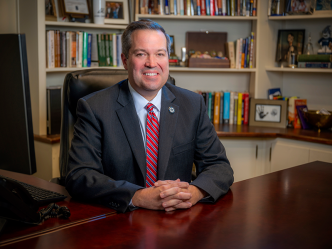The 2022 Georgia legislative session wrapped up Monday, April 4, beginning a 40-day period known as bill review, where Gov. Brian Kemp and his staff will review the passed legislation and then sign it into law.
During this year’s session, the Georgia Legislature has promised $662 million for education in FY 2023, contingent on Kemp’s signature. Below is a roundup of how the legislation will impact Augusta University, the Medical College of Georgia, The Dental College of Georgia and August University Medical Center.
“Augusta University appreciates Gov. Kemp and the General Assembly’s hard work to support the state of Georgia’s commitment to education with the new fiscal budget,” said Augusta University President Brooks A. Keel, PhD. “The $662 million investment shows our students, faculty and staff their work is truly valued, allowing Augusta University to continue serving our community and state through world-class education and medical care and providing our workforce with a supportive environment that allows us to further our mission.”
Augusta University
The primary focus that affects the majority of students within the University System of Georgia will be that FY 2023 includes $230 million to remove the Special Institutional Fee from students’ tuition and fee bills. The USG adopted the SIF in 2009 to make up for revenue loss from state budget cuts.
The new budget also includes an important policy change to lottery-funded HOPE scholarships and grants by setting the HOPE awards at 90% of tuition.
As announced at the end of March, the state legislature has also approved a $5,000 cost-of-living adjustment for benefit-eligible state employees.
Other key funding that will positively benefit AU includes: $99 million to the USG for enrollment increases, with each campus receiving a portion based on a formula for student population increases; $65.9 million to the USG for capital projects, which include larger maintenance and renovations projects; an $8.7 million bond to upgrade Augusta University’s Central Energy Plant on the Health Sciences Campus; $8.3 million for the third year of a three-year phase-in for increased medical education funding; and $1.2 million systemwide to expand nursing capacity to address needs that were amplified during the COVID-19 pandemic.
Medical College of Georgia
The Medical College of Georgia’s 3+ Primary Care Pathway will receive another large boost as the Georgia Legislature has dedicated $8,708,036 in matching funds to expand the program’s endowment to fund scholarships.
Earlier this year, it was announced that the MCG 3+ program will receive $2.1 million in federal funding as part of this year’s FY22 Omnibus Appropriations bill.
“As the state’s only public medical school, it is our responsibility and our privilege to help ensure the health of Georgia’s citizens and communities,” says Dr. David Hess, MCG dean. “This funding will help grow our innovative 3+ Primary Care Program to better ensure all Georgians have access to quality primary care, no matter their zip code. It will help provide scholarships for the medical students who commit to practice frontline medicine in some of the state’s most rural and underserved areas, where the need for physicians is the greatest.”
The continued increase in formula funding will also allow much needed and strategic growth of the medical school overall, including growing important research programs and expanding recruitment of the best and brightest faculty and students, which will ultimately mean more physicians and physician/scientists for our state and nation.
The state legislature also approved $250,000 for new fellowships spots in gynecologic oncology and rural health.
Part of the money will help fund a fourth fellow in the three-year gynecologic oncology program — which is aimed at drawing medical residents back to Georgia to help meet the need for more gynecology oncologists practicing in the state. The gynecologic oncology fellowship is the first and only training program for this subspecialty in Georgia.
It will also help fund a new rural health fellowship spot in family medicine — a one-year fellowship that trains family medicine physicians to practice more independently in rural areas, including providing extra training in focus areas like musculoskeletal medicine, dermatology and behavioral health issues to help reduce the number of times patients need to consult a specialist.
The Dental College of Georgia
The Dental College of Georgia will benefit from $35,000 in new funding for a dental workforce study to help identify the areas of greatest need in Georgia and how best to address those needs going forward.
There will also be a rate increase for select dental codes to improve reimbursement to dentists who treat patients on Medicaid.
Augusta University Medical Center
Augusta University Medical Center, in partnership with MCG and the Department of Public Health, will benefit from over $1 million aimed at two pilot programs helping address health concerns around pregnancies, especially those in high-risk populations.
This includes $680,000 for a cardio-obstetrics pilot program to provide expert, multidisciplinary care to women of childbearing age who have cardiovascular disease and/or are at risk for cardiovascular complications related to pregnancy. Optimization of women’s cardiovascular health before, during and after pregnancy will improve both maternal and fetal outcomes, lowering the maternal mortality rate and reducing health disparities in Georgia.
Another $500,000 is being promised for a comprehensive care management pilot program for high-risk pregnancy populations through a smartphone app where women will check in before and after giving birth. The program was developed after a disparity was discovered between women’s knowledge about blood pressure during pregnancy, adequate navigation to care and provider access — particularly among rural and underserved minority populations.
Postpartum coverage will be increased from six to 12 months, and the Roosevelt Warm Springs Hospitals will see a 10 percent rate increase for long-term acute care services.
What happens next
Bill review will end May 14, and after that, no more bills will be eligible to be signed into law for the year.
 Augusta University
Augusta University





